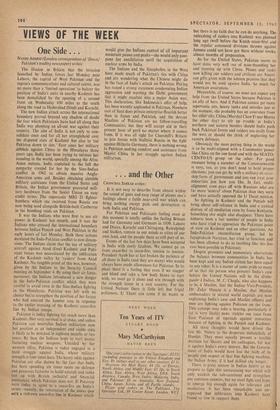VIEWS OF THE WEEK
One Side . . .
NASIM AHMED (London correspondent of 'Dawn,' Pakistan's leading newspaper) writes:
The illusion in Britain that the invasion launched by Indian forces last Monday near Lahore, the capital of West Pakistan and the region's communications and cultural centre, was no more than a 'limited operation' to bolster the position of India's units in nearby Kashmir has been demolished by the opening of a second front on Wednesday 450 miles to the south along the road to Hyderabad (Sind) and Karachi.
The new Indian attack across the international boundary proved beyond any shadow of doubt the fear which Pakistanis have had all along that India was planning an all-out war against their country. The 'aim of India is not only to con- solidate once and for all her stranglehold over the disputed state of Kashmir but also to 'cut Pakistan down to size.' Ever since her military d6bacle against China in the Himalayas three years ago, India has been trying to retrieve her standing in the world, specially among the Afro- Asian nations. India exploited to the full the sympathy created for her by the Sino-Indian conflict in 1962 to obtain massive Anglo- American arms aid. Besides obtaining sizeable military assistance from the United States and Britain, the Indian government procured mili- tary hardware from the Soviet Union on easy credit terms. The supersonic MIG 21 fighter- bombers which she received from Russia are now being used alongside British-built Canberras in the bombing raids on Pakistan.
It was the Indians who were first to use air power in Kashmir last month, and it was the Indians who crossed the international boundary between Indian Punjab and West Pakistan in the early hours of last Monday. Both these actions escalated the Indo-Pakistan conflict to new dimen- sions. The Indians claim that the use of military aircraft against Azad (free) Kashmir and Paki- stani forces was necessitated by the infiltration of the Kashmir valley by 'raiders' from Azad Kashmir. No tangible proof of this was, however, given by the Indians to the Security Council meeting on September 4. By using their air force, moreover, the Indians introduced a new danger in the Indo-Pakistan conflict which they were careful to avoid even in the Sino-Indian fighting in the Himalayas. Pakistan was left with no choice but to strengthen the position of her forces who had entered the Jammu area in response to the earlier crossing of the Kashmir cease-fire line by Indian troops.
Pakistan is today fighting for much more than Kashmir. Her very survival is at stake, and unless Pakistan can neutralise Indian militarism now her position as an independent and viable state is likely to be wrecked in eighteen months or two years. By then the Indians hope to start manu- facturing nuclear weapons. Unaided by her western allies, Pakistan is today engaged in a hard struggle against India, whose military strength is four times hers. The heavy odds against Pakistan are also shown by the fact that India has been spending six times more on defence and possesses factories to build aircraft and tanks (set up with British techniCal and financial assistance), which Pakistan does not. If Pakistan were today to agree to a cease-fire on India's terms--namely, the restoration of the status quo with a redrawn cease-fire line in Kashmir which would give the Indians control of all important mountain passes and peaks—she would only post- pone her annihilation until the acquisition of nuclear arms by India.
The Indians and the Sinophobes in the West have made much of Pakistan's ties with China and are wondering what the Chinese might do in the face of India's attack on Pakistan. Peking has issued a strong statement condemning Indian aggression and warning the Delhi government that it might escalate into a major Asian war, This declaration, like Indonesia's offer of help, has been warmly applauded in Pakistan. Nowhere east of Suez does private enterprise flourish better than in Japan and Pakistan, and the devout Muslims of Pakistan are no fellow-travelling Communists; but they will accept aid in their present hour of peril no matter where it comes from. If it was all right for Churchill's Britain to join forces with Stalinist Russia in the fight against Hitlerite Germany, there is nothing wrong in Pakistan seeking comfort and assistance from Maoist China in her struggle against Indian militarism.


































 Previous page
Previous page